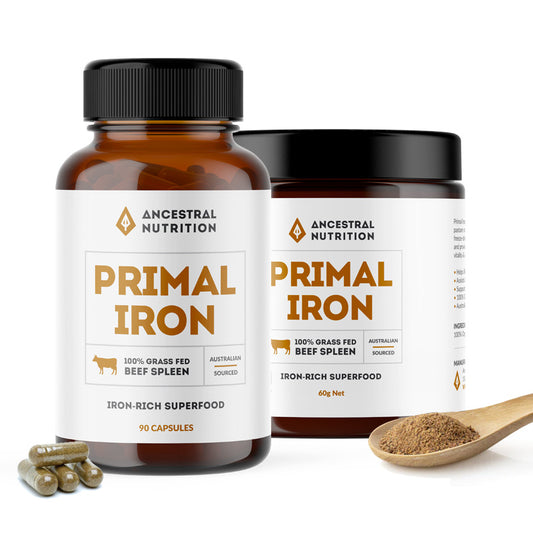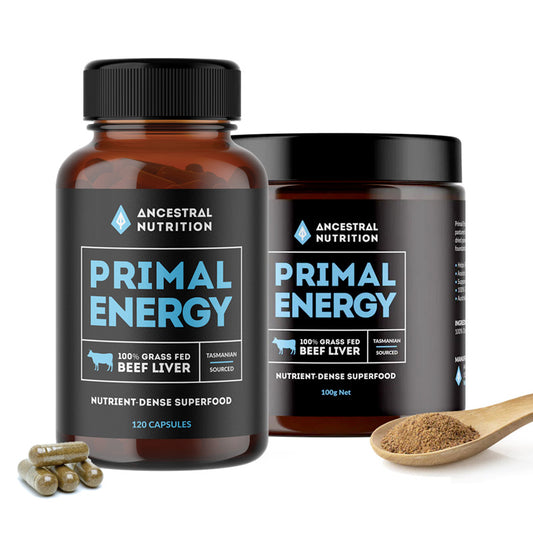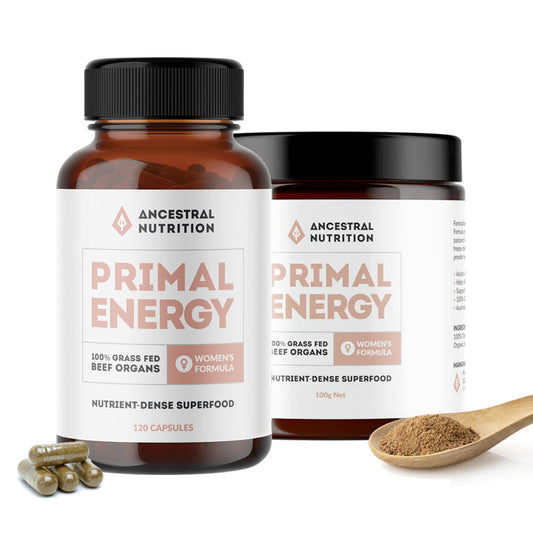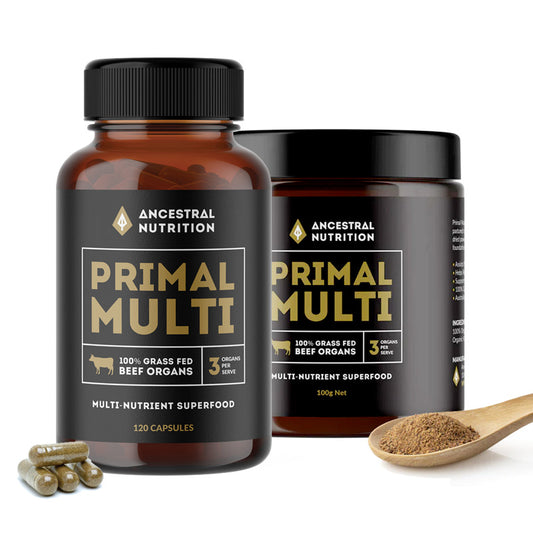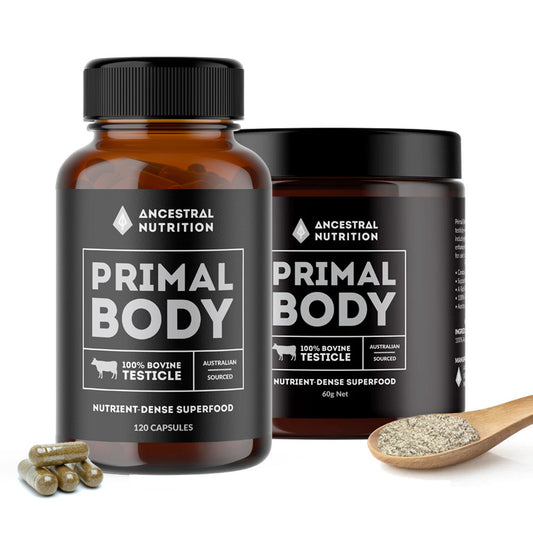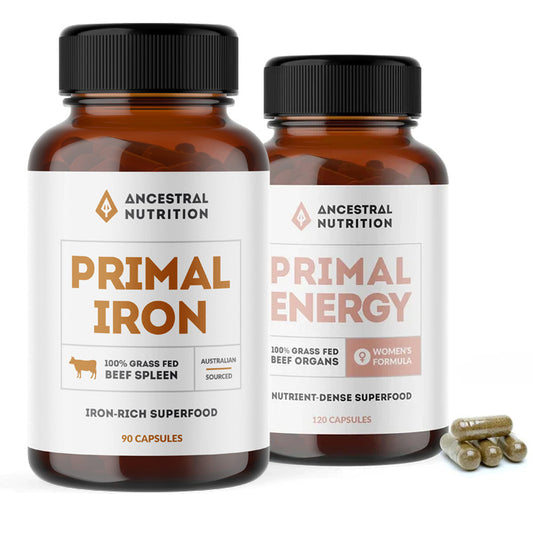The Omega Confusion: Fish Oil, Seed Oil, or Whole Food?
article by Ancestral Nutrition
The Rise (and Fall) of the Fat-Free Era
For decades, dietary fat was demonised. “Low fat” was stamped on every label, while sugar quietly filled the void. But as chronic diseases climbed, scientists began to realise fat wasn’t the villain, it was our misunderstanding of it.
Not all fats are equal. And when it comes to the essential omega fatty acids, omega-3 and omega-6, the story gets even more nuanced. These fats are vital for cell membranes, hormone function, and inflammation balance. Yet the balance between them, not just their presence, may be what truly shapes health.
The Modern Imbalance
Historically, humans consumed omega-6 and omega-3 in a near-perfect 1:1 or 2:1 ratio, thanks to a diet rich in wild meat, fish, and seasonal plants. Today, that ratio has exploded to as high as 20:1 in the Western diet.
The culprit? Industrial seed oils.
Vegetable oils, like soybean, sunflower, safflower, canola, and corn, have become the backbone of processed foods, dressings, and even many “healthy” snacks. They’re cheap, stable on shelves, and highly profitable. But they’re also rich in omega-6 linoleic acid, which, in excess, may contribute to inflammation and oxidative stress when not balanced by omega-3s.
Meanwhile, the average person’s omega-3 intake, EPA and DHA from fish or algae, has plummeted. This imbalance is the foundation of the “omega confusion” that leaves consumers unsure what to believe.
The Fish Oil Fix — or Is It?
When the omega-6 story broke, the supplement industry saw an opportunity. Fish oil became the golden capsule of modern wellness, promising sharper minds, calmer joints, and longer lives. But as with most nutrition stories, the truth is more complex.
Fish oil can be beneficial, but not all are created equal. Many commercial fish oils are highly processed, deodorised, and stored in plastic bottles that expose them to heat and oxygen, both enemies of delicate omega-3 fats. Once oxidised, these oils lose their potency and may even generate harmful compounds.
Whole fish, on the other hand, deliver EPA and DHA in a stable, food-based form, surrounded by antioxidants like selenium, zinc, and astaxanthin. Nature never intended nutrients to exist in isolation.
So while supplementation can be useful in specific cases (for example, if you rarely eat seafood or are addressing a deficiency), relying solely on capsules may not provide the same synergy as real, whole-food sources.
The Seed Oil Controversy
Few topics in nutrition ignite more debate than seed oils. Some argue they’re harmless, others call them “toxic.” The truth lies, again, in context.
Seed oils are industrial products, pressed, refined, bleached, and deodorised, far removed from their ancestral origins. While technically plant-derived, their processing often involves high heat and chemical solvents, producing unstable polyunsaturated fats that can oxidise easily during cooking or storage.
This oxidation creates compounds like aldehydes, which have been linked in research to cellular stress and metabolic disruption. And because these oils saturate nearly every packaged food, from chips to “healthy” salad dressings, most people consume far more than they realise.
It’s not that small amounts are inherently dangerous. It’s that, for most modern diets, omega-6s dominate nearly every meal, crowding out the anti-inflammatory omega-3s that once kept our biology in balance.
Why Whole Foods Still Win
In the ancestral world, we didn’t count omegas, we ate REAL FOOD.
Wild-caught fish, pastured eggs, grass-fed meat, marrow, and even organ meats delivered healthy fats in their natural matrix: protected, balanced, and nutrient-dense. Fat-soluble vitamins A, D, E, and K2 worked in harmony with these fats, supporting hormone balance, immune function, and healthy cell repair.
Contrast that with the modern supermarket: shelves lined with “heart-healthy” vegetable oils, margarine blends, and ultra-processed snacks. Even if the label reads “omega-3 added,” it’s often in a synthetic or unstable form that the body can’t use efficiently.
The ancestral perspective cuts through the noise with simplicity, choose fats that exist in nature, not those born in factories.
How to Rebalance Your Omegas Naturally
You don’t need to swear off all modern oils or live on sardines (although researcher-educator Nick Norwitz MD PhD did eat 1000 sardines in a month* to test the outcome - Google it, it's very interesting). But a few simple shifts can restore your body’s natural equilibrium:
-
Cook with stable fats. Choose butter, ghee, tallow, lard, or cold-pressed olive oil for most meals. These fats resist oxidation and support stable energy.
-
Cut down on seed oils. Swap packaged snacks and store-bought dressings for homemade versions made with olive or avocado oil.
-
Eat more seafood. Two to three servings of wild-caught fish weekly (like salmon, mackerel, or sardines) provide natural EPA and DHA.
-
Choose grass-fed meat. Pasture-raised beef and eggs contain a more balanced omega profile than grain-fed alternatives.
- Think “whole matrix.” Instead of relying on isolated oils, look for whole-food sources where nutrients coexist, like salmon roe, beef liver, or beef liver capsules.
These changes not only rebalance omega intake but reconnect you to the foods humans evolved to thrive on.
The Bigger Picture
The omega conversation isn’t just about fats, it’s about food integrity.
It’s a mirror of how far we’ve drifted from real, unprocessed nourishment. In the pursuit of convenience, we’ve replaced whole foods with extracts, capsules, and synthetic “fixes.” But the human body recognises wholeness. It runs best on foods grown, grazed, and caught, not refined, extracted, or engineered.
True health doesn’t come from chasing the newest supplement trend; it comes from reclaiming what’s been lost to industrialisation. Whether it’s choosing wild fish over a capsule, or cooking with tallow instead of canola, each small shift realigns us with the natural rhythms our ancestors trusted for generations.
Learn More About Beef Organs Here
Nick Norwitz Sardine Experiment*https://www.youtube.com/watch?v=_Th54GWd8WY

